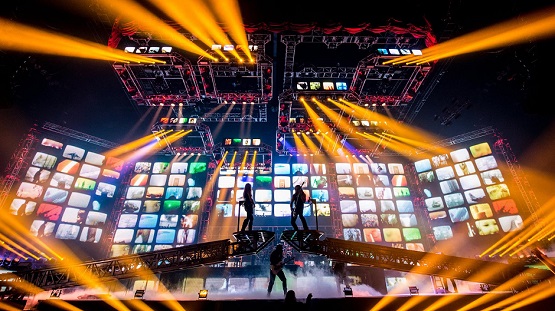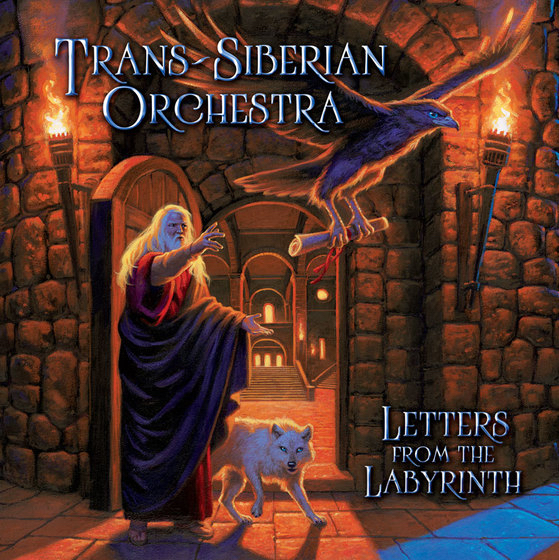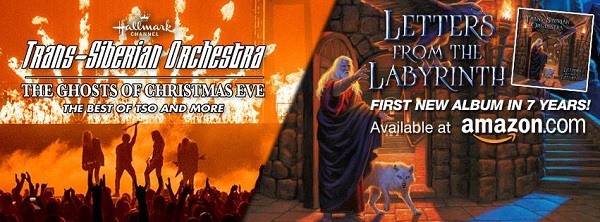TRANS-SIBERIAN ORCHESTRA – “It’s Hard To Hate Someone, Let Alone Shoot Them, That You’ve Gone To A Concert With”
November 25, 2015, 9 years ago

It’s that time of year again when the sense-overloading Christmas juggernaut known as Trans-Siberian Orchestra detonates tinsel terror all over your town, and then poof, are gone, like 5% more of what’s left of your hearing. But this is a special year, in that the band also has ready for launch a new non-seasonal record called Letters from the Labyrinth, some of which will be massaged into this year’s extravaganza.
“Letters from the Labyrinth is a major change from the way TSO creates new works,” explains TSO visionary, conceiver and conductor Paul O’Neill, on what is quite a political album, lifting lessons from all of history, no surprise given O’Neill’s consuming love of world revolutions and evolutions, as well as the collecting of historical documents. “It’s the first album that’s not built around a completed story. Instead, it’s a collection of completed songs that have, basically, left the safety of the studio where they were born. The stories will emerge from their combined journeys. Just as TSO was designed to be a constantly evolving, morphing band over the decades, Letters from the Labyrinth is our first album where we’re experimenting, where we’re calling it an open-ended album. Like our own lives, the story will develop and evolve.”
Giving a glimpse of the philosophical tenor of the record, Paul divulges that, “The opening short story, ‘Time and Distance (The Dash),’ is basically, how we’re all given a certain amount of time on Earth, but we’re not told how much time that is or how we should use it. Each individual has to figure that out for themselves, but it’s also easier to make journeys if you have multiple people with you, not unlike Chaucer’s The Canterbury Tales. The very last story, ‘The Dreams of Fireflies,’ is basically a bedtime, go to sleep tale. Where it just sends you into dreamland. Where you have happy dreams, not nightmares. You take on the world after that.”

In essence, the record might have been a much different animal, had Paul not put himself in a position to experience a geo-political revelation of sorts...
“Yeah, well, there were certain parts to the story that when I had originally written the story... one of them involved what was going on in the Ukraine. Another one, a short story, involved Syria. It was written before the Syrian civil war completely spun out of control, and before the nightmare that spilled out of control in the Ukraine. A good example would be, when I was younger there was a huge hit book called, Raise the Titanic, where they raise the Titanic because it sank in its entirety. The book was a huge hit, but if that book came out today it wouldn’t have worked because now they know the Titanic split up. So, our story was basically dated before I even released it. So, we decided to rewrite it as a series of short stories.”
“Incidences happen, even though we were doing the album,” continues O’Neill. “When we played Wacken this year, which is a big rock festival in Germany... what’s going on in Syria is horrible, but people who are living there don’t care what’s going on; they just want it to end. While I was there, the night before, I was wandering around the campsite—true story—bumped into two young men, about 20. I asked them where they were from, and they were from Iraq. They were Sunni-Muslims. We talked for a little while. About 50 feet away, about 30 minutes later, bumped into two other young men. Also 20s, a little bit older, and they were Shiite-Muslims from Iran. I can’t imagine that during the next three days, there’s no way these guys didn’t bump into each other.”
“I would like to believe that if, God forbid, in two years if these four young men, who are in two separate militias met in combat in Syria in that horrible civil war, that if they recognize each other that not only would they not pull the trigger, I think they would actually un-chamber their weapons. They would say, ‘Hey, wasn’t I at a concert with you at Trans-Siberian Orchestra in 2015?’ It’s hard to hate someone, let alone shoot them, that you’ve gone to a concert with. That is the magic of music. It’s really amazing. So Wacken, which we were at on July 30th, made me rethink the entire album.”

But it was an absolute necessity that the TSO army get Letters from the Labyrinth tied with red bows so Santa’s elves could get back to work mounting the phenomenon that is TSO during the cool Yule.
“Basically, there were three rock operas in the trilogy,” says Paul, asked to explain the holiday show for 2015. “And after we did The Christmas Attic, all three of the rock operas had been performed live. Next year is the 20th anniversary of Christmas Eve and Other Stories, so obviously we’re going to do something big for that. This year, one of my managers said, ‘You know what, you’ve never done The Ghosts of Christmas Eve.” Which originally, we did in 1999 when we got a call from Fox who had a small, I think one hour, mini-movie drop out on December 2nd. They asked us if they could film the band for an hour doing Beethoven’s Last Night, which we had just completed. I said, if you give me an hour, I’ll give you a mini-movie. They’re like, ‘Do you have a script?’ and I’m like, ‘I’ll write it tonight.’ I just quickly scripted together this little thing, where a 15-year-old ends up breaking into this old Vaudeville theatre. She’s a runaway. There, she’s discovered by the caretaker, who uses the ghosts and the spirits from the theatre to turn her life around. Thank God, Fox liked it.”
Adding gravitas, says Paul, “They were able to get the legendary Ossie Davis to play the caretaker, and people like Jewel and Michael Crawford were kind enough to share their talents and play the ghosts. It was only supposed to run once and never again, but it did so well, Fox ran it multiple times. Then it’s basically run on various stations ever since. The DVD has gone multi-platinum. I’ve always liked it. It’s a little gem. It’s fun to watch it at home with your family, but, live, there’s an excitement where you pick up the energy of the person in front of you, to the left of you, to the right of you. We decided if we were ever going to do The Ghosts of Christmas Eve live, it was this year or not at all, so we decided to go for it.”
“Getting the band to this point was hard,” reflects Paul, asked about how the team could possibly top the TSO of 2014, who pretty much executed the most extravagant rock concert this writer has ever seen (and I must say, all of us at BraveWords.com are so proud of Chris Caffery, who we count as a good ol’ metalhead friend from way, way back). “Keeping it here and not letting down expectations is harder. We’re lucky because technology keeps advancing. We want to give people the comfort of what they expect, but something new to make it exciting. That’s getting harder and harder every year, as this thing gets larger and larger.”

“The other thing that has actually really come into its own, especially recently, is the fact that we’re seeing so many people in their young 30s, who first saw the band when they were teenagers and they’re now coming back bringing their own kids. The band has survived the two decade mark and kept its original fan base—much to our happy surprise—and has brought in the next generation. People who had originally seen us as teenagers are returning and bringing their own kids with them. Hopefully, those kids will return and bring their kids with them.”
“We always say that music has got the ability to jump a lot of silly walls people put between people, whether it’s nationality or economic class or religion or whatever. When you jump the generational wall, that’s the biggest jump of all. To a certain degree, TSO had an unbelievably lucky break because when we started to tour. It was 1999. In 1949, there was a great schism in music when Les Paul, and Leo Fender, invented the electric guitar. You either grew up pre-electric guitar—with the Dorsey Brothers and Perry Como—or, post-electric guitar: Elvis Presley, Chuck Berry. When we started to tour, it had been half a century, and now it’s been well over 60 years. So even grandma and grandpa—that’s the Woodstock generation. Unless you’re in your late 90s, for the first time, every generation has rock in common. Which makes it a lot easier for us to jump the generational walls than bands that came before us. We’re very aware that we have a very wide audience, and you have to be very careful that there’s something there for everybody, so everybody keeps coming back every year, whether it’s summer or the winter. It can continue to be at least a partial part of the soundtrack of people’s lives.”
As for the future, the band will continue to provoke minds with their non-seasonal existence, but there’s also the call of... Broadway, live theatre.
“Yes, basically these days, our next step is to head towards Broadway, just because I love the coherent story telling of Broadway. I’ve known a lot of bands that have done rock operas that even after they explain it to me, I’m like, huh? I just don’t get it. Broadway never really got the true edge of rock, and whether it’s from a production point-of-view or it’s just rock credibility, they just simply don’t understand it. For me, it’s just a natural marriage. It’s time for rock to enter Broadway. Not that there’s anything wrong with old fashioned Broadway, but how many times can you re-open Oklahoma!? It’s a great musical, but it’s more suitable for the ‘40s than it is for the new millennium.”












